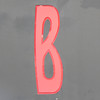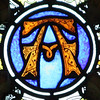haiku email exchange
this is an exchange i had with ken sakamoto, the creator of the beyond-brilliant haiku circus.
from b1:
i love your cartoons
i'm sure bashō is upset
but he's a dead guy
from sakamoto-san:
The cartoons appreciate the love.
Basho's ghost has yet to ring me up.
So far so good.
from b1:
i love your cartoons
i'm sure bashō is upset
but he's a dead guy
from sakamoto-san:
The cartoons appreciate the love.
Basho's ghost has yet to ring me up.
So far so good.










1 Comments:
man.
i could write pages answering this, but the short version is: not that i'm aware of.
a slightly longer version is ...
there are zillions of forms of japanese poetry and i know only a few of them -- there does, however, tend to be an obsession with odd and/or prime numbers in the syllabification, so the answer is "probably not."
however, in a modern form, his response certainly would qualify as haiku. but it's also worth noting that our western concept of 5-7-5 is actually *wrong*. technically haiku worries not about syllables but about the flow-and-meter of a line (i believe this is called "attacks" in english), and in extremely technical documents (the few that i've seen translated), they often use a coding schema that looks something like this for sakamoto-san's response:
' ''' '
'' ' ' '
' ' '
where they are marking stresses, and ignore the concept of syllables altogether. (squirrel would get one stress, handy would get two -- yet they're both two syllable words.) this, however, is extremely technical stuff that is referring both to the way japanese is spoken (which has a different tonal metering to begin with [their musical staff has five notes instead of eight]) and the way a line is viewed according to stress. we don't even *have* these concepts in the west (or if we do, it takes someone like noam chomsky to understand them).
we do, however, have the concept of hard and soft syllables and sakamoto-san's poem response clearly shows that. the top line "seems" shorter than the second, even though they are the same number of syllables. this has to do with attacks, or more loosely speaking the number of words present.
in my eyes he's a guy who clearly knows/possesses several things:
* he's american.
* he knows haiku, in the stricter classical sense, well enough that he often intentionally bashes against the fundamental precepts (the most hilarious example of this is the first cartoon of http://www.haikucircus.com/nov03.htm).
* he's played with haiku enough that he can write outside the strictest structure and still have things he says clearly be haiku or haiku-like.
i sound dopey here, i know, but if you want to see someone who knows this stuff cold, and is really good at explaining it to lay people, look here: http://home1.pacific.net.sg/~loudon/rick.htm
he just brushes the surface of how technical this stuff can get.
for what it's worth,
b1
Post a Comment
<< RETURN TO B1-66ER'S ENTIRE WORLD